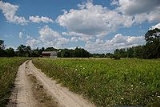
Claireville Conservation Area
Encyclopedia
The Claireville Conservation Area, one of the largest tracts of land owned by the Toronto and Region Conservation Authority
(TRCA), is unique. It was acquired in 1957 to construct a flood control dam and reservoir after the destruction caused by Hurricane Hazel
. The park is a 848 hectare
(2,100 acre
) parcel of conservation land located on the west branch of the Humber River in Brampton
, Ontario
, Canada
. Claireville contains significant natural and cultural heritage
features, and has outstanding recreation, tourism and educational facilities and programs. The Etobicoke Field Studies Centre is located in the southern corner of Claireville and provides programs for student from Grade 1 to Grade 6. Located in the northern corner of the park is the Claireville Ranch, it provides horse riding lessons, trail riding and other group activities. The Indian Line Campground is located at the southern tip of the park, in the Regional Municipality of Peel. It offers 245 serviced and unserviced campsites.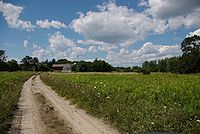
, Chimney Crayfish, Deer
, Muskrat
, Common Garter Snake
. The parks varied landscape can be admired from many vantage points. In 2003 the HSBC BANK donated the funds to plant the HSBC Forest at the Claireville Conservation Area. The park is a favorite with local dog owners, bird watchers and wildlife photographers.
and song birds; brush piles for small mammals and in-water structural habitats like stumps, logs, and rocks for a variety of fish and amphibian species.
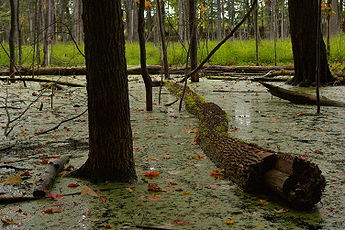
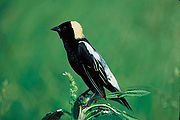
In open fields
In the forest
Semi-Open Brush
Ponds, Marshes, River banks
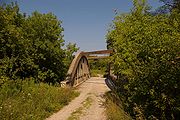 Parking is available at the east and north gates, and at the HSBC forest area. The south gate is located on Gorewood Rd, the east gate is on Regional Road 50 just north of Steeles ave. (The Etobicoke Field Studies Centre is just a short walk from this gate). The north entrance is located at the intersection of McVean Dr. and Regional Road 107. (This is the Claireville Ranch entrance). The northern most area of the park is the HSBC forest, it is located on McVean Dr. 1 km north of Regional Road 107.
Parking is available at the east and north gates, and at the HSBC forest area. The south gate is located on Gorewood Rd, the east gate is on Regional Road 50 just north of Steeles ave. (The Etobicoke Field Studies Centre is just a short walk from this gate). The north entrance is located at the intersection of McVean Dr. and Regional Road 107. (This is the Claireville Ranch entrance). The northern most area of the park is the HSBC forest, it is located on McVean Dr. 1 km north of Regional Road 107.
Toronto and Region Conservation Authority
Toronto and Region Conservation Authority or Office de protection de la nature de Toronto et de la région is one of 36 conservation authorities in Ontario, Canada...
(TRCA), is unique. It was acquired in 1957 to construct a flood control dam and reservoir after the destruction caused by Hurricane Hazel
Hurricane Hazel
Hurricane Hazel was the deadliest and costliest hurricane of the 1954 Atlantic hurricane season. The storm killed as many as 1,000 people in Haiti before striking the United States near the border between North and South Carolina, as a Category 4 hurricane...
. The park is a 848 hectare
Hectare
The hectare is a metric unit of area defined as 10,000 square metres , and primarily used in the measurement of land. In 1795, when the metric system was introduced, the are was defined as being 100 square metres and the hectare was thus 100 ares or 1/100 km2...
(2,100 acre
Acre
The acre is a unit of area in a number of different systems, including the imperial and U.S. customary systems. The most commonly used acres today are the international acre and, in the United States, the survey acre. The most common use of the acre is to measure tracts of land.The acre is related...
) parcel of conservation land located on the west branch of the Humber River in Brampton
Brampton, Ontario
Brampton is the third-largest city in the Greater Toronto Area of Ontario, Canada and the seat of Peel Region. As of the 2006 census, Brampton's population stood at 433,806, making it the 11th largest city in Canada. It is also one of Canada's fastest growing municipalities, with an average...
, Ontario
Ontario
Ontario is a province of Canada, located in east-central Canada. It is Canada's most populous province and second largest in total area. It is home to the nation's most populous city, Toronto, and the nation's capital, Ottawa....
, Canada
Canada
Canada is a North American country consisting of ten provinces and three territories. Located in the northern part of the continent, it extends from the Atlantic Ocean in the east to the Pacific Ocean in the west, and northward into the Arctic Ocean...
. Claireville contains significant natural and cultural heritage
Cultural heritage
Cultural heritage is the legacy of physical artifacts and intangible attributes of a group or society that are inherited from past generations, maintained in the present and bestowed for the benefit of future generations...
features, and has outstanding recreation, tourism and educational facilities and programs. The Etobicoke Field Studies Centre is located in the southern corner of Claireville and provides programs for student from Grade 1 to Grade 6. Located in the northern corner of the park is the Claireville Ranch, it provides horse riding lessons, trail riding and other group activities. The Indian Line Campground is located at the southern tip of the park, in the Regional Municipality of Peel. It offers 245 serviced and unserviced campsites.

Characteristic features
The landscape of the park is diverse. Its characteristic features are numerous creeks and ravines, flat plains, and rolling hills enriching the forested landscape. The TRCA has declared an early 20th century farmhouse in the northern part of Claireville as a heritage property, major restoration began in 2005. The park is home to the Eastern Coyote, Wood DuckWood Duck
The Wood Duck or Carolina Duck is a species of duck found in North America. It is one of the most colourful of North American waterfowl.-Description:...
, Chimney Crayfish, Deer
Deer
Deer are the ruminant mammals forming the family Cervidae. Species in the Cervidae family include white-tailed deer, elk, moose, red deer, reindeer, fallow deer, roe deer and chital. Male deer of all species and female reindeer grow and shed new antlers each year...
, Muskrat
Muskrat
The muskrat , the only species in genus Ondatra, is a medium-sized semi-aquatic rodent native to North America, and introduced in parts of Europe, Asia, and South America. The muskrat is found in wetlands and is a very successful animal over a wide range of climates and habitats...
, Common Garter Snake
Common Garter Snake
The Common Garter Snake is a snake indigenous to North America. Most garter snakes have a pattern of yellow stripes on a brown or green background and their average length is about , maximum about .-Subspecies:...
. The parks varied landscape can be admired from many vantage points. In 2003 the HSBC BANK donated the funds to plant the HSBC Forest at the Claireville Conservation Area. The park is a favorite with local dog owners, bird watchers and wildlife photographers.
Natural area enhancement plan
A multi-year natural area enhancement plan has been developed for Claireville. Some of the recommended activities of this plan include: Protecting and enhancing significant blocks of interior forest habitat and reforestation. Enhancing public use and access to internal trail network and, installing wildlife structures such as nest boxes for waterfowlWaterfowl
Waterfowl are certain wildfowl of the order Anseriformes, especially members of the family Anatidae, which includes ducks, geese, and swans....
and song birds; brush piles for small mammals and in-water structural habitats like stumps, logs, and rocks for a variety of fish and amphibian species.


Birds
Dozens of bird species can be seen. Some use the park as a stop on their migratory route, others breed in the park. Bring your binoculars and a field guild. Claireville is the largest conservation area owned by the TRCA. in the Greater Toronto Area.In open fields
- Eastern MeadowlarkEastern MeadowlarkThe Eastern Meadowlark, Sturnella magna, is a medium-sized icterid bird, very similar in appearance to the Western Meadowlark. It occurs from eastern North America to South America, where it is also most widespread in the east.-Description:...
- Red-Winged BlackbirdRed-winged BlackbirdThe Red-winged Blackbird is a passerine bird of the family Icteridae found in most of North and much of Central America. It breeds from Alaska and Newfoundland south to Florida, the Gulf of Mexico, Mexico, and Guatemala, with isolated populations in western El Salvador, northwestern Honduras, and...
- BobolinkBobolinkThe Bobolink is a small New World blackbird and the only member of genus Dolichonyx.-Description:Adults are 16–18 cm long with short finch-like bills. They weigh about . Adult males are mostly black, although they do display creamy napes, and white scapulars, lower backs and rumps...
- American WoodcockAmerican WoodcockThe American Woodcock , sometimes colloquially referred to as the Timberdoodle, is a small chunky shorebird species found primarily in the eastern half of North America...
- Savannah SparrowSavannah SparrowThe Savannah Sparrow is a small American sparrow. It is the only widely accepted member of the genus Passerculus...
In the forest
- Rose-breasted GrosbeakRose-breasted GrosbeakThe Rose-breasted Grosbeak, Pheucticus ludovicianus, is a large seed-eating songbird in the cardinal family . It breeds in cool-temperate North America, migrating to tropical America in winter.-Description:...
- Pileated WoodpeckerPileated WoodpeckerThe Pileated Woodpecker is a very large North American woodpecker, almost crow-sized, inhabiting deciduous forests in eastern North America, the Great Lakes, the boreal forests of Canada, and parts of the Pacific coast. It is also the largest woodpecker in America.Adults are long, and weigh...
- Red-eyed VireoRed-eyed VireoThe Red-eyed Vireo, Vireo olivaceus, is a small American songbird, 13–14 cm in length. It is somewhat warbler-like but not closely related to the New World warblers...
- Blue JayBlue JayThe Blue Jay is a passerine bird in the family Corvidae, native to North America. It is resident through most of eastern and central United States and southern Canada, although western populations may be migratory. It breeds in both deciduous and coniferous forests, and is common near and in...
- American RobinAmerican RobinThe American Robin or North American Robin is a migratory songbird of the thrush family. It is named after the European Robin because of its reddish-orange breast, though the two species are not closely related, with the European robin belonging to the flycatcher family...
- Great-Crested flycatcherGreat Crested FlycatcherThe Great Crested Flycatcher is a large insect-eating bird of the tyrant flycatcher family. It is the most widespread member of the genus, Myiarchus, in North America and is found over most of the eastern and mid-western portions of the continent...
- Hairy WoodpeckerHairy WoodpeckerThe Hairy Woodpecker is a medium-sized woodpecker, averaging approximately 250 mm in length with a 380 mm wingspan...
- Scarlet TanagerScarlet TanagerThe Scarlet Tanager is a medium-sized American songbird. Formerly placed in the tanager family , it and other members of its genus are now classified in the cardinal family . The species's plumage and vocalizations are similar to other members of the cardinal family.-Description:Adults have pale...
Semi-Open Brush
- Northern Oriole
- Eastern KingbirdEastern KingbirdThe Eastern Kingbird, Tyrannus tyrannus, is a large Tyrant flycatcher.Adults are grey-black on the upperparts with light underparts; they have a long black tail with a white end and long pointed wings. They have a red patch on their crown, seldom seen...
- Field SparrowField SparrowThe Field Sparrow is a small sparrow.Adults have brown upperparts, a light brown breast, a white belly, wing bars and a forked tail. They have a grey face, a rusty crown, a white eye ring and a pink bill....
- House WrenHouse WrenThe House Wren, Troglodytes aedon, is a very small songbird of the wren family, Troglodytidae. It occurs from Canada to southernmost South America, and is thus the most widely distributed bird in the Americas. It occurs in most suburban areas in its range and it is the single most common wren...
- Yellow Shafted FlickerNorthern FlickerThe Northern Flicker is a medium-sized member of the woodpecker family. It is native to most of North America, parts of Central America, Cuba, the Cayman Islands, and is one of the few woodpecker species that migrate. There are over 100 common names for the Northern Flicker...
- Indigo BuntingIndigo BuntingThe Indigo Bunting, Passerina cyanea, is a small seed-eating bird in the family Cardinalidae. It is migratory, ranging from southern Canada to northern Florida during the breeding season, and from southern Florida to northern South America during the winter. It often migrates by night, using the...
- Grey Catbird
- Brown ThrasherBrown ThrasherThe Brown Thrasher , sometimes erroneously called the Brown Thrush, is a bird in the Mimidae family, a group that also includes the New World catbirds and mockingbirds.-Description:...
Ponds, Marshes, River banks
- Wood DuckWood DuckThe Wood Duck or Carolina Duck is a species of duck found in North America. It is one of the most colourful of North American waterfowl.-Description:...
- Tree SwallowTree SwallowThe Tree Swallow, Tachycineta bicolor, is a migratory passerine bird that breeds in North America and winters in Mexico, Central America and the Caribbean. It is a very rare vagrant to western Europe....
- MallardMallardThe Mallard , or Wild Duck , is a dabbling duck which breeds throughout the temperate and subtropical Americas, Europe, Asia, and North Africa, and has been introduced to New Zealand and Australia....
- Song SparrowSong SparrowThe Song Sparrow is a medium-sized American sparrow.Adults have brown upperparts with dark streaks on the back and are white underneath with dark streaking and a dark brown spot in the middle of the breast. They have a brown cap and a long brown rounded tail. Their face is grey with a streak...
- Bank Swallow
- Rough-Wing Swallow
- Eastern PhoebeEastern PhoebeThe Eastern Phoebe is a small passerine bird. This tyrant flycatcher breeds in eastern North America, although its normal range does not include the southeastern coastal USA....
- Cliff SwallowCliff SwallowThe Cliff Swallow is a member of the passerine bird family Hirundinidae — the swallows and martins.It breeds in North America, and is migratory, wintering in western South America from Venezuela southwards to northeast Argentina...
Location


